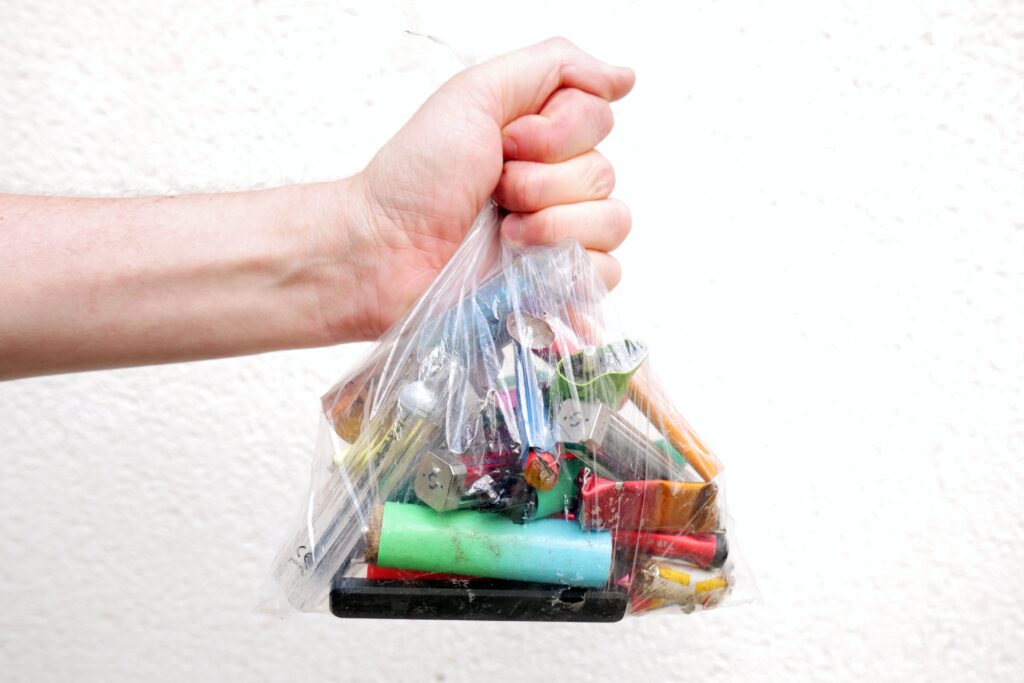The ban, which came into force on 1 June 2025, outlawed the sale of disposable vapes across the UK in a bid to curb youth vaping and reduce electronic waste.
To meet the government’s new “reusable” standard, vapes must now be both rechargeable and refillable.
Distributors are also legally required to provide a takeback scheme for used devices and components, ensuring that consumers have a safe route to recycle old products.
Retailers left with stock after the ban are obliged to send single-use vapes for recycling, rather than selling them on, a move designed to keep lithium-ion batteries out of general waste.
Battery fires on the rise
Between June and September 2025, waste management company Biffa uncovered more than 840,000 discarded vapes across just four of its major sites in Teesside, Walsall, Ipswich and North London.
Biffa reports that since June 2025, it has recorded more than 180 fires across its UK operations linked to lithium-ion batteries – many believed to originate from vapes.
According to the company, the number of vapes found in waste streams rose sharply after the summer’s ban, with nearly 20,000 more devices discovered across its key sites in August and September compared to June and July.
Craig Konczak, Business Director of MRFs and PRFs at Biffa, explained: “Lithium-ion batteries are by far the biggest hazard. Found in everything from vapes and toys to laptops and seasonal decorations for Diwali, Halloween and Christmas, they are regularly discarded where they don’t belong – residual waste and recycling bins.

“At Biffa, we’ve seen this firsthand. A devastating fire at our Aldridge MRF in the New Year was a stark reminder of the stakes: the risk of harm, costly repairs and service disruptions – all avoidable with better prevention.”
Reusable vapes causing new issue
The risk comes down to the lithium-ion batteries inside every vape.
When damaged or crushed during collection or processing, these cells can enter a process known as thermal runaway, rapidly heating to extreme temperatures and igniting nearby materials.
Figures from Material Focus show that more than 1,200 battery-related fires broke out in UK refuse vehicles and waste facilities during 2023/24, a 71% increase on the previous year.
Part of the problem lies with the very reusable vapes the ban was meant to encourage.
Many of these devices are sold at a similar price point to the old disposable models, leading some consumers to use them briefly, recharge them and then discard them, often with battery charge still inside.
The risk of thermal runaway is directly linked with the state of charge of a battery, with batteries below 50% state of charge unlikely to enter thermal runaway and ultimately catch fire. Therefore, discarded single-use vapes tend to have a lower state of charge and a resulting lower risk of fire, whereas reusable vapes are likely to have a state of charge above 50% when thrown away.
Konczak added: “The ban on the sale of single use vapes from June 1 was meant to help keep batteries out of bins, but convenience culture persists – many smokers continue to discard rechargeable vapes just as quickly.
“They’re not expensive and, coupled with a limited availability of replacement parts, it’s often easier to just throw them away and buy a new one.”
Solutions: kerbside battery collections and education
As waste fires continue to rise, industry groups are urging government and regulators to step up public education and enforcement.
Clearer labelling, widespread collection points and stronger communication campaigns are essential to preventing more incidents.
Konczak explained: “Current safe disposal options for batteries, vapes and small WEEE – including in-store return points and household waste recycling centres – are underused, either through indifference, lack of awareness or the inconvenience of getting there.
“The ESA’s proposal for universal kerbside battery collections, funded by producer responsibility reforms, could save £6 billion over a decade and cut fire incidents from 1,200 to just 100.
“Ultimately, prevention is key. If everyone reading this shared the dangers of improper battery disposal with just a few friends or family members, we could reach thousands – and start making real change.”










Subscribe for free